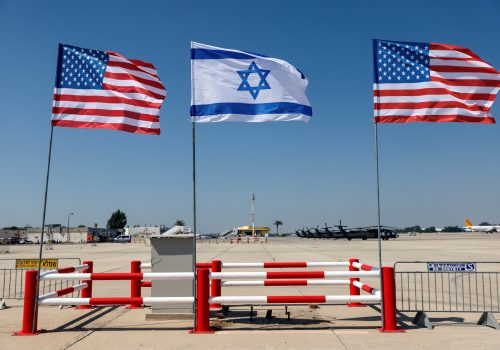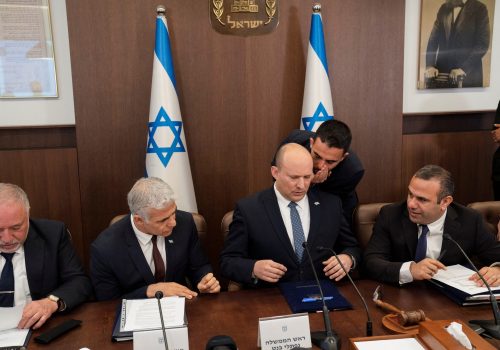Israel’s military operation against PIJ was a short-term success. Here’s how it could be a longer-term one too.
Israel’s military operation against Palestinian Islamic Jihad (PIJ) infrastructure in the Gaza Strip came to a formal close at 11:30 PM local time on August 7. Operation Breaking Dawn was launched on August 5 when the Israel Defense Forces (IDF) mobilized preemptively to thwart imminent revenge attacks, after Israel arrested PIJ chieftain Bassam al-Saadi in Jenin on August 1. What has been widely recognized as an Israeli tactical success could also—possibly, if not assuredly—lay the groundwork for consolidating an even more impactful strategic transformation.
The balance sheet after three days of battle substantiates accounts of Israel’s resounding victory over PIJ, a group sanctioned by the United States, the European Union, and a host of other governments for its involvement in terrorist activity.
Tayseer Jabari and Khaled Mansour—commanders of PIJ’s Northern Gaza and Southern Gaza divisions, respectively—were targeted and eliminated, along with additional members of the organization’s top echelon. Official Palestinian sources confirmed that combatants comprised more than half of the deaths in Gaza. IDF Spokesman Brigadier-General Ran Kochav informed reporters that more civilians were actually killed by failed PIJ missile launches than by Israeli air force sorties; Kochav’s claim was later afforded a degree of corroboration by the Associated Press. In the case of an explosion in Jabalya, where four children were included among the victims, a potent Israeli public diplomacy effort quickly countered charges of IDF culpability for the incident.
No serious casualties were suffered in Israel. Of the more than 1,100 rockets which PIJ fired on the country, 96 percent of those deemed capable of exacting significant damage were intercepted and destroyed by the Iron Dome defense system. Israel also managed to delicately thread the needle, effectively neutralizing the PIJ threat in Gaza while ensuring, at the same time, that Hamas—which dominates Gaza—remained outside the fray, thus, containing the potential for escalation into a broader conflict.
The same holds true for what would have been a dangerous spread of the violence to the Palestinian population in the West Bank or, more perilously, to Israel’s Arab citizens. The August 7 visits of a record 2,200 Israeli Jews to the Temple Mount—where they marked the annual commemoration of the destruction of the First and Second Temples—proceeded without incident as well.
Critically, from Israel’s standpoint, the campaign was brought to a swift end, before a seemingly inevitable miscalculation could occur and bring about some catastrophe that might have caused Israel’s allies’ relative support for the offensive to dissipate.
Events unfolded in Israel’s favor for multiple reasons. Beyond its superior firepower, Israel was able to collect and employ high-quality intelligence that enabled precision strikes against PIJ objectives. Caretaker Prime Minister Yair Lapid resisted intense public pressure to lift the preventive lockdowns on areas adjacent to Gaza, biding his time until the circumstances aligned for the IDF to spring into action. The assault against Jabari was synchronized purposefully to coincide with a fictitious fuel shipment to Israel’s Kerem Shalom border crossing with Gaza.
Also contributing to Israel’s resilience was a rare display of unity between its political leaders. Opposition leader Benjamin Netanyahu appeared for—and was photographed at—his first proper consultation with Lapid. Defense Minister Benny Gantz—another contender for the premiership in Israel’s upcoming November 1 election—and Lapid displayed harmony of function as well. Consensus allowed military planners to focus on their mission without the distraction of dissenting voices.
Previous rounds of fighting have historically concluded with an expectation of the one to follow next. But could the final act of Operation Breaking Dawn hold the seeds of a different future amid the shifting sands of the Middle East?
The apparent refusal by Israel’s government to release two PIJ prisoners, Al-Saadi and Khalil Awawdeh, as part of the ceasefire agreement reinforces the administrative separation between Gaza and the West Bank, thereby strengthening the hand of Hamas as an ostensible address for Israel in the south. Senior Israeli officials are speaking of a new “opportunity” to secure the handover of Israelis being held in Hamas captivity and to advance “cooperation [that] we can do, predominantly through Egypt, to improve the situation in Gaza.”
Counter-intuitive as it may seem, Hamas—despite its famous animosity toward Israel—may yet emerge as an independent, if not unlikely, interlocutor for the Jewish state, notwithstanding the difficult implications that this could have for Palestinian President Mahmoud Abbas in Ramallah. Israel’s quick removal of sanctions on Gaza and immediate reinstatement of work permits for Gaza residents subsequent to the truce will serve to cultivate pragmatism within Hamas ranks.
Equally noteworthy is the fact that local PIJ ranks in Gaza were able to impose their will for a cessation of hostilities with Israel over the objections of their movement’s Secretary-General, Ziad Nakhaleh, who—while meeting with Islamic Revolutionary Guard Corps Commander-in-Chief General Hossein Salami in Tehran on August 5—summoned other Gaza-based factions to take up weapons alongside PIJ militants.
These developments take place against the backdrop of the Abraham Accords, the normalization deals signed between Israel and an array of Arab countries across the Middle East and Africa. Statements by the United Arab Emirates and Morocco—two kingdoms that are forging new diplomatic relationships with Israel—pointedly refrained from criticizing Israel’s conduct in Gaza, attesting to the robust nature of these contacts. Eventually, the example of these mutually beneficial ties might persuade decision-makers in both the West Bank and Gaza to also favor constructive engagement with Israel over an alternative fate of increased isolation and despair.
Shalom Lipner is a nonresident senior fellow for Middle East Programs at the Atlantic Council. From 1990 to 2016, he served seven consecutive premiers at the Prime Minister’s Office in Jerusalem. Follow him on Twitter @ShalomLipner.
Further reading
Wed, Jul 13, 2022
Biden is visiting Israel. Travel is squarely on the agenda.
MENASource By
One lesser-known element of Washington’s alliance with Israel will be squarely on US President Joe Biden’s agenda: Israel’s long-running quest to join America’s visa waiver program.
Mon, Aug 1, 2022
Biden’s trip to the Middle East: Outcomes and opportunities
Event Recap By
On July 21st, the Middle East Programs’ Israel Project, in collaboration with the Scowcroft Middle East Security Initiative, hosted a virtual event titled “Biden’s trip to the Middle East: Outcomes and opportunities.”
Thu, May 19, 2022
In Israel’s domestic political theater, the plot thickens
MENASource By Shalom Lipner
The tenuous prospects of Prime Minister Naftali Bennett's ruling coalition are fanning speculation from critics that its box office run will be cut short.
Image: Palestinians gather at the scene where senior commander of Islamic Jihad militant group Khaled Mansour was killed in Israeli strikes, in Rafah in the southern Gaza Strip, August 7, 2022. REUTERS/Ibraheem Abu Mustafa


